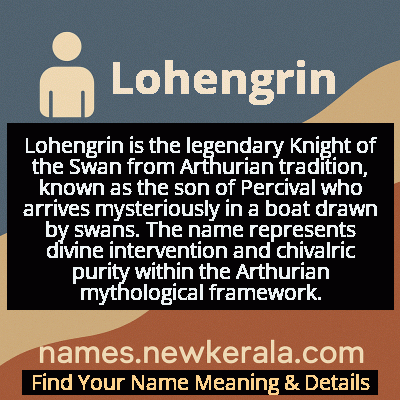Lohengrin Name Meaning & Details
Origin, Popularity, Numerology Analysis & Name Meaning of Lohengrin
Discover the origin, meaning, and cultural significance of the name LOHENGRIN. Delve into its historical roots and explore the lasting impact it has had on communities and traditions.
Name
Lohengrin
Gender
Male
Origin
Arthurian
Lucky Number
3
Meaning of the Name - Lohengrin
Lohengrin is the legendary Knight of the Swan from Arthurian tradition, known as the son of Percival who arrives mysteriously in a boat drawn by swans. The name represents divine intervention and chivalric purity within the Arthurian mythological framework.
Lohengrin - Complete Numerology Analysis
Your Numerology Number
Based on Pythagorean Numerology System
Ruling Planet
Jupiter
Positive Nature
Optimistic, inspirational, and creative.
Negative Traits
Scattered, exaggerating.
Lucky Colours
Yellow, gold, purple.
Lucky Days
Thursday.
Lucky Stones
Yellow sapphire.
Harmony Numbers
1, 2, 9.
Best Suited Professions
Arts, writing, communication.
What People Like About You
Creativity, optimism.
Famous People Named Lohengrin
Lohengrin (Legendary)
Arthurian Knight
Knight of the Swan who arrives in a boat drawn by swans to rescue Princess Elsa of Brabant
Lohengrin (Operatic Character)
Opera Protagonist
Title character in Richard Wagner's 1850 opera 'Lohengrin'
Lohengrin Filipello
Television Presenter
First presenter of the Eurovision Song Contest in 1956
Name Variations & International Equivalents
Click on blue names to explore their detailed meanings. Gray names with will be available soon.
Cultural & Historical Significance
Wagner's Lohengrin became a symbol of the artist as mysterious savior and the tragic consequences of human curiosity, reflecting broader cultural anxieties about faith, identity, and the boundaries between mortal and divine. The opera's famous bridal chorus and swan imagery have become embedded in Western cultural consciousness, while the character's story continues to inspire adaptations across various media. Lohengrin's enduring appeal lies in his representation of the perfect, unattainable hero who must ultimately withdraw from human society, making him a poignant figure in the exploration of idealism versus reality.
Extended Personality Analysis
Lohengrin embodies the archetype of the perfect knight - noble, courageous, and spiritually pure, yet marked by an essential mystery that sets him apart from ordinary humanity. His character demonstrates unwavering commitment to justice and protection of the innocent, combined with deep compassion and romantic devotion. However, this ideal exterior conceals a tragic complexity: he operates under divine constraints that prevent full emotional disclosure, creating a figure who is simultaneously accessible and distant, loving yet ultimately unattainable.
This tension between his divine mission and human relationships defines his personality, making him both admirable and pitiable. He represents the ideal of selfless service and perfect chivalry, yet his inability to fully integrate into human society reveals the limitations of such perfection. The psychological depth of his character emerges through his struggle to balance his sacred duties with earthly love, culminating in the tragic realization that complete honesty would destroy the very foundation of his miraculous intervention. This makes Lohengrin not just a heroic figure, but a profound exploration of the costs of idealism and the inevitable gaps between divine purpose and human understanding.
Modern Usage & Popularity
In contemporary naming practices, Lohengrin remains an exceptionally rare choice, primarily confined to German-speaking regions and families with strong cultural or artistic backgrounds. The name's strong associations with Wagnerian opera and Arthurian legend make it a distinctive but challenging choice for modern parents. Its usage has never approached mainstream popularity, and current trends show minimal adoption, with the name maintaining its status as a literary and operatic reference rather than a practical given name. The complexity of the name, combined with its heavy cultural baggage and old-fashioned sound, makes it unlikely to experience significant revival, though it occasionally appears in intellectual or artistic circles as a statement of cultural sophistication.
Symbolic & Spiritual Meanings
Lohengrin symbolizes the intersection of divine grace and human limitation, representing the ideal of purity and chivalry constrained by spiritual boundaries. The swan that transports him serves as a multifaceted symbol of transformation, beauty, and the connection between earthly and celestial realms, while his silver armor and mysterious arrival embody the archetype of the miraculous savior. His story represents the eternal human longing for perfect intervention in times of crisis, while simultaneously acknowledging the tragic impossibility of maintaining such perfection within human relationships. The character stands as a metaphor for the conditional nature of faith and the painful consequences when mortal curiosity challenges divine mystery, making him an enduring symbol of both idealistic hope and the necessary boundaries that separate different realms of existence.

